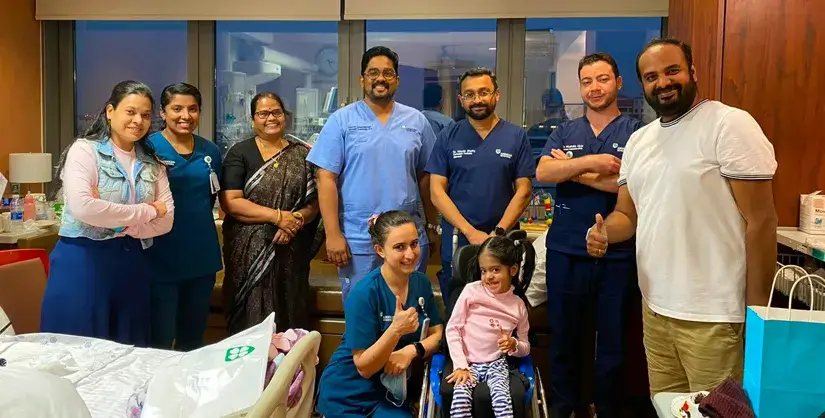
She is lovingly called Mayra, a clever little girl who suffers from an unexplained neuromuscular condition that is associated with severe weakness, restricted motor skills, and dependence on everyday activities on her dedicated parents.
Dr. Nayan and his multidisciplinary team treated her over the past six weeks, helping her come off the breathing machine during waking hours and enable discharged home to live a more joyful life with her family and friends.
Mayra was admitted to the hospital with a bad chest infection due to a virus (Rhinovirus) that usually causes the common cold, a self-limiting condition in most people. But for Mayra due to her vulnerable condition, this minor infection had led to severe consequences with need for artificial breathing support.
Her recovery was challenging due to her motor weakness and relatively malnourished state. When conventional methods failed to liberate her from the breathing support a strategy of improving nutrition, chest clearance with regular physiotherapy, judicious use of medicines and excellent nursing care to prevent the common intensive care-related complications led to success. The breathing support was gradually weaned over several days and the breathing tube was removed.
She was transitioned to non-invasive support, with a mask providing the interface and helping overcome her weakness. For an intelligent, strong-willed child who knew her own mind the answer was clear. "No," she said after the first trial of non-invasive support. With gentle persuasion, kindness and bribing, as well as help from her devoted but firm parents, we were able to persuade her to change her mind. " I want to go back on," was a phrase we never thought we would hear from her. Yes, she still needs support from the breathing machine when asleep because she is unable to breathe effectively, but her parents have been trained to provide this for her at home and this allows her to have a fuller life than in the hospital.
We knew from experience that such events are extremely traumatic and life-changing for the family, not dissimilar to those experienced by soldiers returning from war. Recognizing when parents need help and providing timely support is key to the rehabilitation of the family unit and the long-term success of our efforts. A great number of things changed for Mayra, a new-found appreciation for the range of bespoke recipes prepared for her by the hospital kitchen, a new cohort of people who would be her WhatsApp and Facebook friends, and respect for all those things that her parents would ask her to do but she never listened. But one thing, we are glad to say, did not change, her personality, her outspokenness, and her attitude.
The family was able to witness a multidisciplinary team of professionals at the peak of their abilities, professionals who would form the gold standard for all comparisons in the future. They were delighted to take Mayra home and no doubt they would re-live these 45 days, several times, as they relay it repeatedly to their families and friends over dinners and coffees and long trips!
Patient Experience